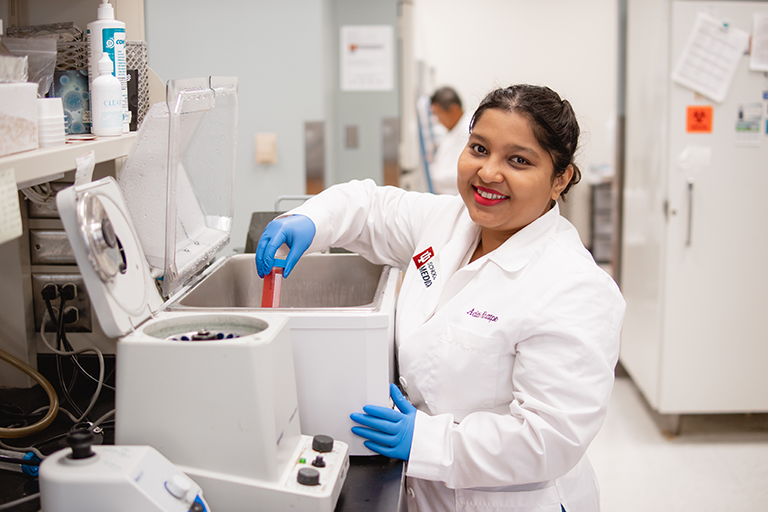By Cindy Dashnaw Jackson
September 18, 2023
We must give back to society, says 2023 Deutsch Scholarship awardee
Researcher and Ph.D. student Aditi Khatpe is the 2023 Deutsch Scholarship awardee. She’s earning her degree through breast cancer research at the Indiana University Melvin and Bren Simon Comprehensive Cancer Center.
Khatpe was a research assistant at the Indian Institute of Science Education and Research (IISER) in India when she applied to Ph.D. programs. She wanted an institution where she could replicate the atmosphere she’d enjoyed at IISER. She said the collaborative IU Simon Comprehensive Cancer Center best fit her criteria.

“We had collaborators in India, but it was more than that: I could talk to patients and staff and clinicians, so it was more of a connection,” Khatpe said. “You build your network so that you have clinicians who will tell you if a drug will work, patients who will tell you about their drug experience, staff to help you out. Your research becomes more of a group effort. I always want this access wherever I am.”
She found that at the cancer center and has continued her research into breast cancer begun at the IISER.
I got interested in breast cancer because of its high incidence rate in females and why some patients benefit from targeted therapies while others do not.
Aditi Khatpe, M.Sc. – Ph.D. Candidate Indiana University School of Medicine
“Nowadays, if you talk to almost anyone, they have had breast cancer somewhere in their family. I know it’s very bookish, but that’s what I care about. My mom always says we are born out of society and it’s our duty to pay back to our society, so you have to work in a way that lets you give to society.”
Working with Harikrishna Nakshatri, BVSc, Ph.D., Khatpe began her research by evaluating the role of a specific protein coding gene, TONSL, in the earliest stages of breast cancer development. Ultimately, she discovered a potential new target for breast cancer therapy and is among the authors in this study published in Cancer Research.
“TONSL is amplified in 20 percent of women with breast cancer and 30 percent with metastatic breast cancer, so we tried out a particular drug that targeted TONSL. With such high rates of amplification, more research on targeting TONSL is very important,” she said.
Khatpe presented her findings at the 2023 American Association for Cancer Research, where she received an AACR Scholar-in-Training award.
“But the most exciting thing, what gives you satisfaction, is knowing that your work can reach the patient. I chose this field, translational research, because I’ve always wanted to connect with the patient and people around me,” she said.
She also found a passion for childhood cancer.
“The [conference] session that impacted me the most was pediatric oncology. Diffuse midline glioma (DMG) affects younger patients, the median survival is 18-20 months, and the first line of treatment is radiation, after which everything is purely experimental. These situations have always motivated me,” Khatpe said. “After graduation, I will continue my work in cancer therapeutics as a post-doctoral researcher, and I plan to work in pediatric cancers like DMG.”
For now, after one review, two publications, and a first-author study, Khatpe feels she has reached a milestone.
“I can call myself a cancer biologist,” she said.
The Deutsch Scholarship will contribute to her current research.
“My research was initially funded by my PI (principal investigator). Now that I can contribute with the scholarship, I get more satisfaction and feel even more a sense of responsibility,” she said.
About the Author
Cindy Dashnaw Jackson finds and tells nonprofit stories that inspire audiences to share, show up and support. She honed her ability to craft a message that fits an audience during 20 years in nonprofit PR and communications. Now a freelancer and founder of Cause Communications LLC, she's a copywriter and storyteller for nonprofits across the United States. And she earned her degree at IUPUI.
The Deutsch Scholarship
The Walter A. and Laura W. Deutsch Research Endowment supports Ph.D. and M.D./Ph.D. students and postdoctoral fellows pursuing degrees in biomedical sciences who have demonstrated potential for conducting oncology research. Successful applicants are students or fellows with a strong academic record, outstanding character and well-defined professional goals.




